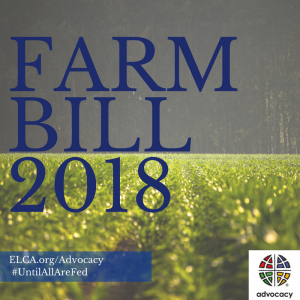The Farm Bill is an omnibus legislation that helps to fund our national and global food programs. Reauthorized every five years, the Farm Bill is among legislation that Congress needs to pass this year. To learn more, check out the Farm Bill Resource and ELCA Advocacy’s Farm Bill recommendations here.
The House Agriculture Committee passed H.R. 2 – Agriculture and Nutrition Act of 2018 (Farm Bill reauthorization bill) on April 25, 2018 by a vote of 26-20. This marks one of the first times that a Farm Bill passed out of committee on a party line vote. The Farm Bill is usually one of the most bi-partisan bills in Congress with the last vote being a 68 in favor, 32 in opposition result in the Senate, and a 251 in favor and 161 in opposition in the House of Representative. ELCA Advocacy opposes the House bill in its current form for several reasons detailed below.
Act of 2018 (Farm Bill reauthorization bill) on April 25, 2018 by a vote of 26-20. This marks one of the first times that a Farm Bill passed out of committee on a party line vote. The Farm Bill is usually one of the most bi-partisan bills in Congress with the last vote being a 68 in favor, 32 in opposition result in the Senate, and a 251 in favor and 161 in opposition in the House of Representative. ELCA Advocacy opposes the House bill in its current form for several reasons detailed below.
Nutrition
The House bill includes new work requirements for able-bodied adults receiving Supplemental Nutrition Assistance Program funds (SNAP, formerly known as Food Stamps). These requirements put many people at greater risk of hunger as they divert funding away from direct food assistance to pay for ineffective work mandates. There are already work requirements under current law and creating additional requirements will lead to unnecessary and complicated burdens, which come in the form of added bureaucracy and verification that ultimately reduce the effectiveness of SNAP. Mandating additional work requirements, education and job training will create more barriers for low income people who are already struggling to free themselves of the cycle of poverty. We urge Lutherans to advocate to their representatives for protection of SNAP programs without hidden cuts to benefits, to ensure our neighbors have access to food.
Environmental
The House Farm Bill appears to be a mixed bag: it creates positive changes to help farmers, but there are uncertainties that linger over some of the benefits of some changes. The Conservation Stewardship Program (CSP) is expected to be eliminated and some funding will instead be diverted to the Environmental Quality Incentives Program (EQIP). These programs help improve farming practices through reducing fertilizer use, better management of manure and building fences to manage livestock movement so as to keep them away from streams.
Additionally, the bill redesigns the structural funding of programs, and switches many of them from permanent to temporary or a one-time funding. These programs include the Conservation Stewardship Program which is rolled into the Environmental Quality Incentives Program; the Rural Energy for America Program; the Biomass Crop Assistance Program; and the Biorefinery, Renewable Chemical & Biobased Product Manufacturing Assistance. Some of the benefits for the Farm Bill includes the way it boosts other items such as agricultural trade, crop insurance and creation of a national vaccine bank to fight foot-and-mouth disease.
The forest management provisions would be changed to allow for bigger and faster forest-thinning projects under the current exclusion from certain reviews under the National Environmental Policy Act (NEPA) with the purpose being to reduce wildfire risk or address disease and insect infestation. This revision also includes the elimination of the requirement for a consultation under the Endangered Species Act as long as the listed species are deemed not to be harmed. It is too early to fully determine the impact of the changes. We must proceed cautiously, to provide the protections needed for our farmers and farms while doing these in an environmentally safe manner.
International Food Aid Programs
The House bill makes some important reforms to the international food programs, including authorizing the Food for Peace program to purchase food commodities from local and regional farmers, something we have advocated for a long time. Additionally, the bill removes the 15% requirement for monetization of food commodities, which will allow implementing organizations to utilize the appropriate range of tools and interventions depending on what’s needed and the context, such as food vouchers and cash transfers. These changes will increase efficiencies in international food aid programs. Unfortunately, the bill does not make any changes to the cargo preference requirement (a regulation that requires at least 50 percent of the nation’s overseas-bound food aid to be transported by U.S.-flag ships), something that we would like Congress to address in order to save on the cost of shipping and enable more food to reach the people who need it most.
What’s Next
The Senate Agriculture Committee is expected to release a bi-partisan Farm Bill later this month that will build on the successes of the bill enacted in 2014. It is expected that this will be an improvement over its House companion. The House is expected to vote on their Farm Bill during the second week of May. We ask you to urge your members of Congress to write a bipartisan Farm Bill that will pass in both chambers.
Lutheran Presence
Christ taught us in the Lord’s Prayer to pray for our daily bread. Martin Luther’s expansive understanding of daily bread includes not only what nourishes our bodies, but also the natural resources, labor and the economy, including the food supply chain. Advocacy for good policies in the Farm Bill responds to God’s love for us through active love for neighbor by shaping policy that will provide daily bread for people, care for creation and contribute to a just world where all are fed.
